English Words in Action, Group H
(a variety of English words which have developed through history and are currently used in our modern age)
Simply click on this banner (or the following link) and you will be on your way to stimulate your brain for greater word comprehension with quizzes based on some of the words in this unit.
2. Expressing, showing, or causing feelings of enjoyment or pleasure: Marla could hear her children's happy laughter as they were playing in the living room.
Ralph would be happier if the project could be completed sooner.
3. Used in a special greeting or wish for another person on a special occasion: Father said, "Happy birthday, Jim!"Their friends called out, "Happy traveling, Alisha and Karl!"
2. An oration or written speech that expresses strong emotions or beliefs: Some of the radio talk-show hosts spend most of their programs presenting one harangue after another.
There are all kinds of harangues; such as, those of a politician who is striving for votes or support for a legislative bill, or of a promotor who is trying to obtain money, or the lobbyist who is representing special interests, or any passionate young rebels who are trying to reform the government of their country.
3. Etymology:from [Middle English arang, "a speech to an assembly", from Old French harangue, from Old Italian aringa, from aringare, "to speak in public"; possibly from aringo, arring, "public square, meeting place", of Germanic origin.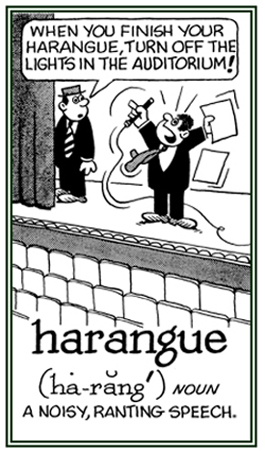
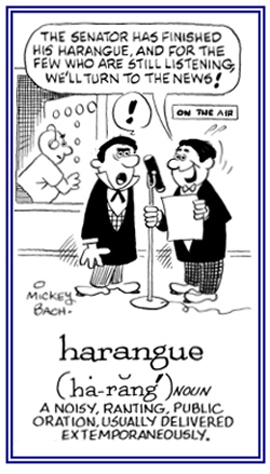
Go to this Word A Day Revisited Index
so you can see more of Mickey Bach's cartoons.
2. To criticize or to question someone, or to try to persuade someone to do something in a forceful angry way: The politician harangued voters for their failure to support the economic stimulus plan.
It seems that some government legislators never tire of haranguing their fellow members either for support of their particular bills or to denounce the opposition for not giving their approval.
2. To impede and exhaust an enemy by attacking repeatedly or with repeated raids: The military troops continued to harass the entrenched rebels who were hiding in caves.
3. To irritate or to torment persistently: Jillian watched the small bird as it continued to harass the large crow that was flying over the garden.
4. To wear out; to exhaust: Janine was harassed by all the demands of her new job and she felt totally exhausted by the end of the first week.
Just about everyone has been harassed at one time or another, and at such times it may seem that each individual is being "hounded" unmercifully by those who oppose them.
5. Etymology: from French harasser, from which harass is derived and which has the same range of meanings as its English counterpart, and it is derived from the Middle French harer, meaning "to set a dog on".This verb is derived from Old French hare, a cry used to encourage hunting dogs during the chase.
Although hare is of Germanic origin, akin to Old High German hara, hera, "hither", and hiar, "here"; its specific origin seems to be unknown.
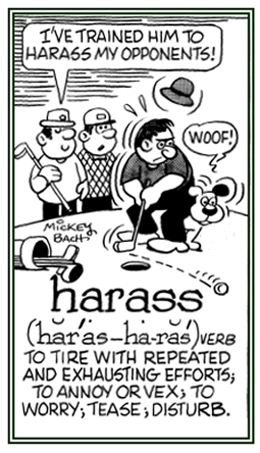
Go to this Word A Day Revisited Index
so you can see more of Mickey Bach's cartoons.
2. Something that indicates or points out what is to come; a forerunner: The improvement in the company's sales is a harbinger of better economic conditions in Bruce's community.
Frost and the falling of leaves are harbingers of winter.
The completions of the objectives of the project are harbingers of better working conditions for the workers.
3. Etymology: from Middle English herbengar, "a person sent ahead to arrange lodgings", from Old French herbergeor, from herbergier, "to provide lodging for", from herberge, "lodging" or "army shelter" (from heri, "army" + berga, "shelter").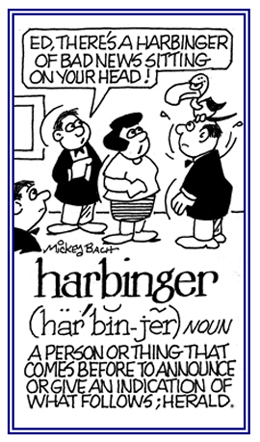
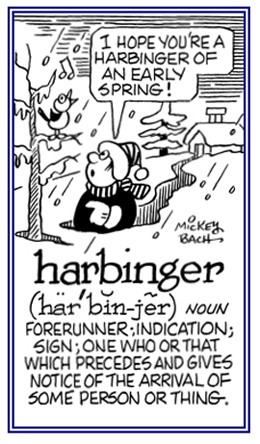
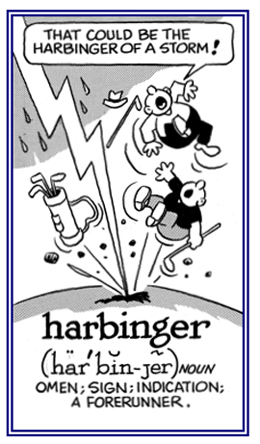
Go to this Word A Day Revisited Index
so you can see more of Mickey Bach's cartoons.
2. Capable of surviving in unfavorable conditions, such as cold weather or a lack of moisture: The hardiest plants are those that exist in deserts or in extreme weather conditions year after year.
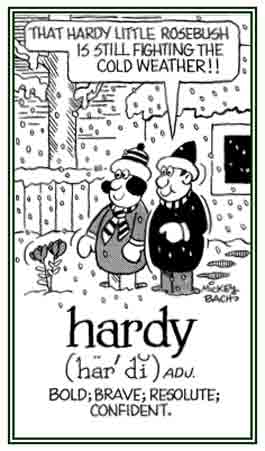
Go to this Word A Day Revisited Index
so you can see more of Mickey Bach's cartoons.
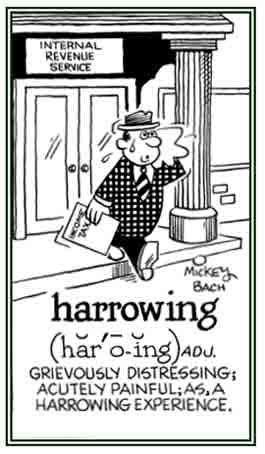
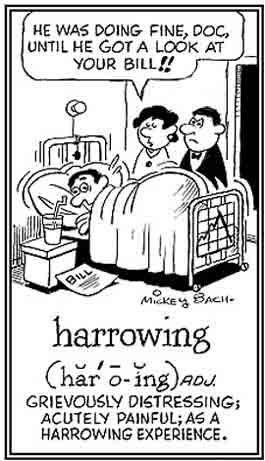
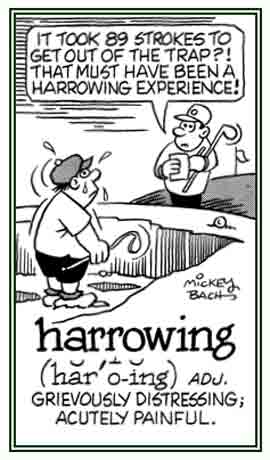
Go to this Word A Day Revisited Index
so you can see more of Mickey Bach's cartoons.
A haughty person treats other people as if they are inferior and not worth being around.
The local snack bar was Mildred's favorite haunt for writing her stories.
2. To obsess the mind constantly until it is relieved by coming to a solution: Not knowing the meaning of the word haunted Harriet until she found its definition.
3. To be continually present in; to pervade: All of the terrible things that are happening in the world haunt a lot of people.
4. To inhabit, to visit, or to appear in the form of a ghost or other supernatural being: There were those who thought the old house was being haunted by ghosts because of the strange noises that the neighbors frequently heard late in the nights.
2. Lived in or visited by ghosts: That haunted house kept people away from it, including those who otherwise wanted to break in.
Links to all of the groups of English words in action, Groups A to Z.
You may see the bibliographic list of sources of information for these words in action.


